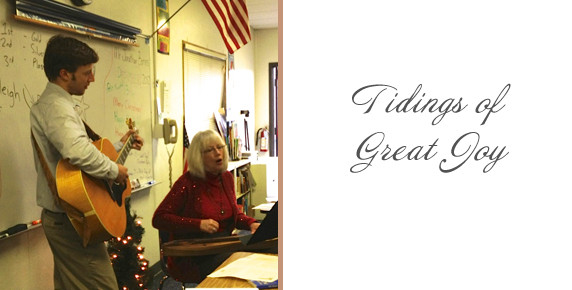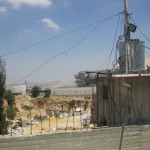14
2012Tidings of Great Joy

I’m still ten feet from the classroom door, my arms full of musical instruments, when the potent smells of cuisine from Mexico, Iraq, and Afghanistan accost me. Nine AM is a little early for raw onions and garlic, coriander and cumin, but today is the Christmas party and the beautiful women I am about to meet in this room have spent hours preparing their best and most festive dishes. My son Jonathan teaches an English class for adult immigrants, and he has invited me to share some different musical instruments and to sing for them the Christmas carols that are part of our celebration of this holiday.
Each day 40 adults, many of them refugees, enter Jonathan’s classroom eager to learn the language that will help them unlock their dreams of freedom and prosperity in their new home. As I look around the room I notice most are women, some wearing headscarves, and all dressed professionally. They take this opportunity seriously, grateful for the chance their new country is giving them to improve their lives. One smiling woman tells me she is from Afghanistan; another man cheerfully corrects my pronunciation when I repeat the name of his country, Iraq. They tell me what a wonderful teacher my son is, and I beam with pride as I see him living CrossWise, reaching out a hand to help these men and women, most older than he, with the difficult transitions they are experiencing as newcomers to our nation.
The preprinted Christmas word scramble Jonathan is using as a warm-up activity today contains words like elves, Santa, stockings, reindeer. I laugh as I see him trying to explain mistletoe and what it is used for. I delight to hear the class, in accents from around the world, pronounce in unison the word, “Grinch.” Today’s vocabulary words are the seasonal terms these men and women will read in advertisements, see on television, and hear from their children. I’m a little sad, but not surprised, that words like stable, manger, and Savior are missing.
But this is, in part, why I’ve come. I’ve brought a dulcimer and banjo, traditional American instruments, and Jonathan accompanies me on guitar while we teach Christmas carols to his students. As I watch their earnest faces following along on the lyric sheets, trying their best to comprehend what they are singing, I have to deliberately steel myself against the emotion I am feeling or I will never be able to get through the songs. I’m hoping something upbeat will help to set the right tone of celebration.
When they hear the opening chords of “Joy to the World,” they all break into grins at the cheerful sound of the banjo. As I play “Away in a Manger” on the dulcimer, I’m happy to be singing to them about my little Lord Jesus asleep on the hay. A bit surprised, I smile when women wearing hijabs whip out their iPhones to capture the excitement of their beloved teacher and his mom singing Christmas carols for them.
Watching these gracious foreigners who are relishing the freedom they’ve found in this country, I recall our trip to the Middle East in the months following the Arab Spring. Most shocking to me was the squalor and chaos of Cairo, and that indelible image helps me to visualize a bit of the kind of hell many of these men and women have escaped from.
But it is when we start, “O Little Town of Bethlehem” that I find it difficult to maintain my composure. When we were in Bethlehem, we walked through bleak urban rubble of the Palestinian territories on our way to the Church of the Nativity, the literal place on earth where the little Lord Jesus lay asleep on the hay. Passing a very non-scenic overlook, our guide pointed out that this was the site of the Shepherd’s field. It is where the angel and heavenly host appeared and made the most important announcement in history:
Do not be afraid, I bring you good news of great joy that will be for all the people. Today in the town of David a Savior has been born to you; he is Christ the Lord…. Glory to God in the highest, and on earth peace to men on whom his favor rests. – Luke 2:10-14
Today as I sing about the little town that I walked in 2000 years later, I can’t help but think about the difficulty of the lives of the people who live in so many war-torn parts of the world, and about the peace that eludes them. I think of Jesus, the Prince of Peace who came to earth because he loves us and wants to give us a peace that passes understanding. I see the brave men and women before me yearning to live free, and I can’t help but hope that that will include spiritual freedom as well.
My heart is full as we sing to them about a holy night, a night divine, the night of our dear Savior’s birth, when he appeared and gave the world a thrill of hope. Today, I rejoice in that hope. As the words of the Christmas carols containing the gospel are literally on their lips and in the lyric sheets in their hands, I find myself praying that God would give them ears to hear and a heart to respond to these tidings of exceeding great joy.
